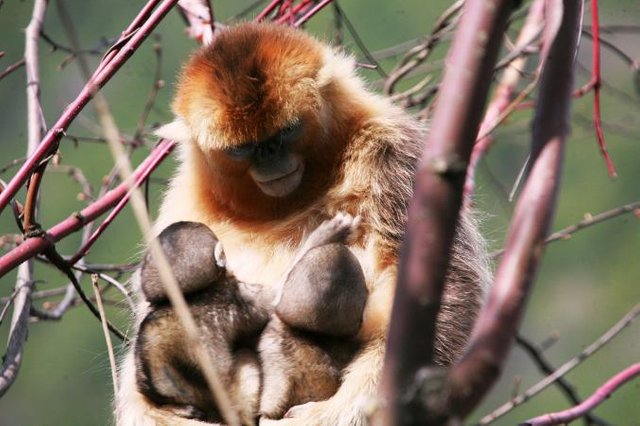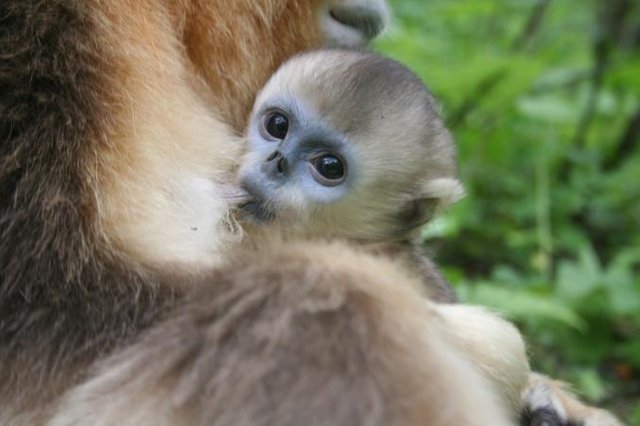Why do these monkeys nurse each other’s babies?

Lactating and nursing costs a lot of energy. There must be some benefit to spending it on someone else’s infant.
Being a mom is hard enough, but imagine mothering someone else’s kids, too. That’s the norm for golden snub-nosed monkeys, according to a new study in the journal Science Advances. Scientists found that over a five-year period, more than 87 percent of golden snub-nosed monkey infants were nursed by females other than their mothers—a phenomenon called allonursing.
While allonursing has been documented in a number of rodent and carnivore species, as well as some primates, it is not common. This is the first evidence of allonursing in an Old World monkey.
Monkey Mothering
Allonursing on a regular basis has only been reported in about 40 mammal species, and researchers weren’t expecting to see this behavior when they first started observing the behavior of groups of the monkeys in central China’s Shennongjia National Nature Reserve in 2012.
Zuofu Xiang, a professor of wildlife conservation at Central South University of Forestry and Technology in China and one of the new study’s authors, says it wasn’t until they noticed a female simultaneously suckling two infants that the idea even occurred to them.
“When we started tracking newborns, we were surprised to find that allonursing was common during the first three months of an infant’s life,” says Xiang.
Xiang and his colleagues found that over the course of five birth seasons, more than 87 percent of infants suckled from females that were not their mothers.

Researchers in China had been studying these monkeys for several years when they noticed a mother feeding two babies at once. That's when they realized allonursing was a common practice among the species.
Relatedness was an important factor, with grandmothers or aunts tending to provide the extra nourishment. Reciprocity also seemed to play a role, as most mothers nursed another female’s baby if that female had previously nursed their own.
Got Milk?
One reason this finding was surprising is that milk is a costly form of investment in one’s offspring. Why would it benefit a mother to make that investment in another’s child?
“Lactation is one of the most energetically expensive things a mammal can do, short of pregnancy itself—female mammals literally create a new substance from scratch using resources available in their own body, at huge cost,” says Kirsty MacLeod, a behavioral and evolutionary ecologist at Lund University, Sweden, who was not involved in this study.
“Allonursing is most often found where females live in very closely related groups, where nursing your nephew or niece still benefits you because they share your genes, or in species that gives birth to multiple young at a time, so providing some milk to an extra baby isn’t that costly,” says MacLeod.
“Primates don’t often fall into either category. Although there are many primates that live in social groups, the majority of species do not nurse each other’s young, so this report of allonursing in golden snub-nosed monkeys is significant and interesting.”
It Takes a Village
So why are golden snub-nosed monkey mamas so generous with their milk?
Related females co-reside and socialize within larger groups, and they all give birth within a short time period each year. These factors are conducive to allonursing, but they don’t make these monkeys unique.
What may set them apart is their habitat. Golden snub-nosed monkeys live in high-elevation temperate forests with long, cold winters (nighttime temperatures commonly drop below freezing) and strong seasonal changes in food availability. Allonursing could enhance infant survivorship in the face of these environmental challenges.

Allonursing may give infants a survival advantage during winters, the researchers posit.
In the study, Xiang and his colleagues recorded six instances of infants who did not receive nursing from another female. Four of them died during the winter (before weaning), whereas only six of the 40 infants who were allonursed died (and this includes two cases of male infanticide that occurred when a new male took over a group).
Allonursing could stack the odds in an infant’s favor by providing extra nutrients for accelerating growth and development. It may also provide a more diverse set of immune compounds to infants, improving their resistance to various diseases and parasites.
The behavior may benefit mothers, too. By taking some of the energetic burden off of mothers and spreading it around among related females, mothers may be able to reinvest energy and resources into future offspring.
Xiang says that it is unlikely that any single set of conditions can explain why allonursing has evolved in disparate species.
“While allonursing has benefits to infants and mothers, and variables like availability of female kin and environmental harshness may make it more likely in some species, there are primates with a similar constellation of socioecological factors that do not exhibit allonursing,” he says.
It seems that for some mammals, it may take a village to raise the young. Sharing nursing duties with your relatives just makes sense for golden snub-nosed monkeys.
Reference: https://www.nationalgeographic.com/animals/2019/02/golden-snub-nosed-monkeys-nurse-others-babies/
Images are public domain.